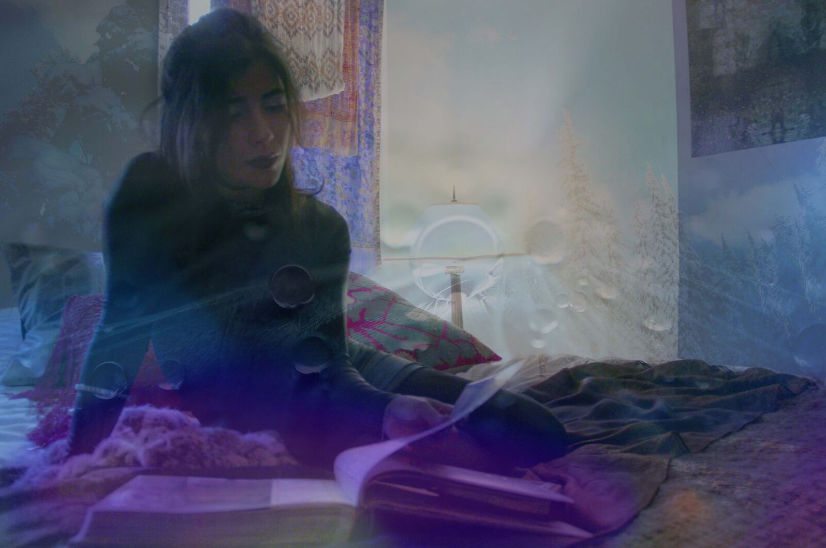|
The Breadcrumbs widget will appear here on the published site.
John Quinn Pays Court to the Shade of William Morris through his Daughter, MayWords by Benjamin Goluboff Image by Christine Stoddard QuailBellMagazine.com *Author's Note: John Quinn (1870-1924) was a patron and collector of modern art. Ezra Pound called Quinn Maecenas after the wealthy Roman who was patron to Horace and Virgil. Miss Morris had been given an introduction to Quinn by Esther Pissarro with whom the attorney was in correspondence about acquiring the luminous Vue d'Havre by Camille Pissarro, that is, pere not fils. This was 1909 and Miss Morris
was no longer in the first flush of a beauty that had thrown the young Shaw from his satirical high horse. But when he met her at Customs, a lackluster winter day, Quinn felt a light break upon him. The willowy figure, the wavy hair that gave way before the fine high brow: all this sustained Quinn in the illusion that May had not disembarked a Cunard liner where she'd endured a second-class winter crossing, but had stepped, all roseate and golden, from the canvas where Rosetti, (fond with love himself) had painted her as a girl. For a week, during which it seemed they were on the verge of something, Quinn showed May New York: champagne suppers, strolls in the Ramble, even a private interview in Quinn's bachelor rooms where the attorney showed May treasures from his collection by her father. On his library table Quinn displayed a first edition of The Earthly Paradise, a yard of immaculately preserved wallpaper in the master's early Trellis pattern, and, jewel of the collection, the enormous Kelmscott Chaucer, with engravings by Burne-Jones. May found Quinn's reverence for her father charming and a little peculiar: such fervent anti-modernism in this wide-awake New York lawyer, who viewed the Morris family's socialism with amused contempt, but May knew herself, in spite of the politics, to be strongly drawn to the man. Quinn had his reasons for avoiding what the founders called entangling alliances, and there were other women on the margins of this picture, but he had long night thoughts, that week, about adding Miss Morris to his collection. One night, when Quinn had asked May to attend with him a reception at Columbia for the British ambassador, a great snow fell on the city, delighting his British visitor and prompting Quinn, a person rarely given to impulsive decisions, to send regrets to Columbia, hire a trim little sled, a pair of greys with harness bells, and to take May out for a tour of the storm. The streets were busy despite the fast-falling snow. Shoppers and carolers enjoyed a Broadway transformed, where each shop window fronted on a square of illuminated weather, and where the spire of Grace Church disappeared upward into a roiling cloud of grey. May drew closer to Quinn, and whispered that here was a scene worthy of Pissarro (pere, not fils). Here, Quinn knew, was the moment to kiss her, to put things on a different footing, but something, now, intervened. Coming north through the forties they passed a group of carolers whose melody merged briefly with the bells of the greys: The snow in the street and the wind on the door; Minstrels and Maids stand forth on the floor. May smiled at Quinn in recognition and Quinn smiled back even though, in that instant, everything had changed for him. For there, seated with them behind the greys, was another rider. Present and absent, a creature of the storm and the Broadway lights, invisible to May, it seemed, but definite, pronounced as the note from a plucked string that hangs in altered air: the master of Kelmscott, Morris himself. He appeared, perhaps, as he had been in life: stocky and short, round-shouldered, with that twitchy inconsequent bearing that both friends and detractors mocked. Quinn was most aware of the long sorcerer's beard that hung vaporous -- the tail of a comet -- from the apparition's broad benign face. Through the beard the specter smiled upon May's escort, then faded as the sled approached Columbus Circle. In the days that remained before May left for Ontario (the next stop of her New World tour) it seemed the two had drawn back from the verge. Or Quinn had, at least. Miss Morris may still have had her hopes. But, touched by the past on that night of storm, Quinn was satisfied, replete, the owner now of a strange Victorian blessing. May felt this change in him, but never knew the cause. They wrote letters, of course, and Quinn would advise Miss Morris as she edited the master's Complete Works for Longman. They saw each other once or twice more when Quinn crossed the pond on trips for his health or his collection, but while May might have held a slim Pre-Raphaelite candle, Quinn had moved on. Still, every Christmas he sent May a bushel of New York apples, and a tasteful card. CommentsComments are closed.
|








